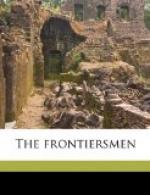Despite the evil chance that had befallen the gold-seekers, now widely bruited abroad, stealthy efforts were ever and anon made by the hardy frontier prospectors of those days, already busy in the richer deposits of the Ayrate division of the Cherokee country, to pan also the sands of the banks of the Tennessee; but the yield here was never again worth the work, and the interest in the possibility of securing “pay gravel” in this region died out, until the later excitements of the discovery of the precious metal in a neighboring locality, Coca Creek, during the last century.
The old “waste town” long remained a ruin, and at last fell away to a mere memory.
THE BEWITCHED BALL-STICKS
At no time in the history of mankind, except during that brief Paradisiac courtship in the Garden of Eden, has the heart of a lover been altogether unvexed by the presence, or even the sheer suspicion, of that baleful being commonly denominated “another.” Here, however, it would seem that the field must needs be almost as clear. The aspect of the world was as if yet young; the swan, long ago driven from the rivers, still snowily drifted down the silver Tennessee; the deer, the bear, the buffalo, the wolf in countless hordes roamed at will throughout the dense primeval wildernesses; the line of Cherokee towns along the banks represented almost the only human habitations for many hundred miles, but to Tus-ka-sah the country seemed to groan under a surplus of population, for there yet dwelt right merrily at Ioco Town the youthful Amoyah, the gayest of all gay birds, and a painful sense of the superfluous pressed upon the brain at the very sight of him.
This trait of frivolity was to Tus-ka-sah the more revolting, since he himself was of a serious cast of mind and possessed of faculties, rare in an Indian, which are called “fine business capacity.” He was esteemed at an English trading-house down on the Eupharsee River as the best “second man” in any of the towns; this phrase “second man” expressing the united functions of alderman, chief of police, chairman of boards of public improvements, and the various executive committees of civilization. His were municipal duties,—the apportionment of community labor, the supervision of the building of houses and the planting of crops, the distribution of public bounty, the transaction of any business of Ioco Town with visitors whom individual interest might bring thither. So well did he acquit himself when these errands involved questions of commercial policy that the English traders were wont to declare that Tus-ka-sah, the Terrapin, had “horse sense”—which certainly was remarkable in a terrapin!




